|
 |
 |
|
 |
 |
|
 |
 |
|
 |
 |
| |
|
|
|
| |
Bran Fendigaid
Alias Bendigeitvran
Raven
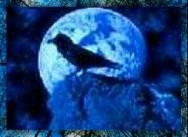
Celtic God
Rebirth & Regeneration
|
|
|
| |
|
|
|
|
 |
 |
|
|
 |
 |
|
|
 |
 |
 |
 |
|
 |
 |
|
|
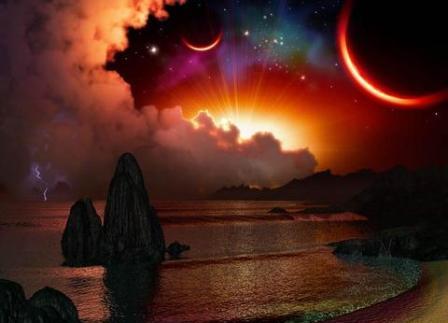
The Voyage of Bran
Immram Brain was one of the oldest tales in Irish literature. It was
said that the narrative was first compiled in the 7th century. However, the present work was preserved in two extant works:
The
Book of the Dun Cow (early 11th century) and the Book of Leinster (mid-12th century).
|
|
|
 |
 |
|
|
 |
 |
 |
 |
|
 |
 |
|
 |
 |
|
 |
 |
|
 |
 |
|
 |
 |
|
|
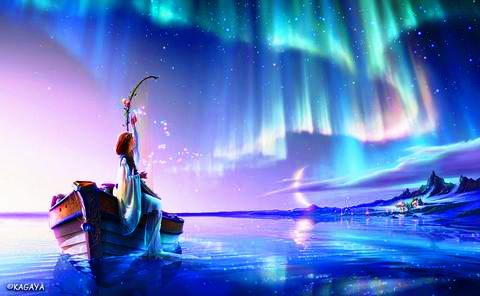
Raven
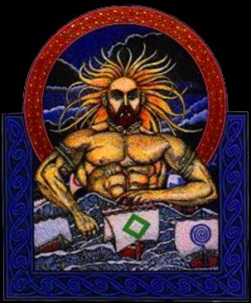
Bran Fendigaid (the Blessed) was the son of the
Sea God, Llyr and, maternally, the grandson of Belenos, the Sun God. His name
means Raven, and this bird was his symbol. In Celtic mythology, Bran appears as a semi-humanized giant residing at Castell
Dinas Bran, the later home of the later Kings of Powys.
Though Bran himself was supposed to have been an early King of the Silures tribe of Gwent. There appears to be no
archaeological evidence for his worship though perhaps the castle mount was once sacred to him. Geoffrey of Monmouth transformed
him into an early British King named Brennius, though his story probably relates to King Bran Hen of Bryneich.
One Irish tale tells how Bran fell asleep, one day, while listening to the beautiful song of a goddess with whom he
fell deeply in love. She sang of a mystical Otherworld far away on a Westerly Island.
So the following day, Bran and his three foster-brothers and twenty-seven warrior-followers set off in their ships
to find this wondrous land. On their journey, Bran encountered his half-brother, Manawyddan, God of the Sea, and eventually
reached the Land of Women.
Here the goddess greeted him and they spent a whole year together happy and fulfilled. Eventually though, some of Bran's men
wished to return home, but the goddess warned them that if they were to step foot on the British Isles,
they would crumble to dust for, in reality, many centuries had passed since they had left home. Bran, however, ignored her
warning and returned home. On reaching the shore, however, the first man to step ashore found the goddess' warning to be true,
and his fellow mariners were forced to sail the seas for evermore. Perhaps Bran found some magical way back to his own time,
for he is better known from an old Welsh tale, in the Mabinogion, concerning the marriage of his sister, Branwen.
Desirous of an alliance with other Celtic nations, Bran gave his sister, Branwen, in marriage to King Matholwch of
Ireland. This was not, however, a universally
popular move and his brother, Efnisien was completely outraged. He maimed the
Irish horses and caused so much offense that Bran felt obliged to give Matholwch his wondrous magic cauldron in recompense.
Though the Irish King was satisfied with the apology, his people did not forget so easily and after some years, despite
Branwen bearing him a son named Gwern, Matholwch was persuaded to eject the lady from the court to work in the kitchens. Branwen
therefore sent her pet starling (for which we should perhaps read raven) to seek help from her brother in Wales. King Bran was astonished to hear of the ill-treatment
of his beloved sister. He immediately gathered his mighty army and crossed (or waded in Bran's case) the Irish
Sea to rescue her. Matholwch retreated westward upon seeing the mighty Welsh forces. Bran helped his men cross
several mighty rivers in order to follow him and Matholwch was eventually forced to offer to abdicate in favor of his son
and Bran's nephew, Gwern. Bran only accepted on the understanding that a house was also built that was big enough to hold
him. Unfortunately, at the feast to celebrate the truce, Efnisien threw Gwern
into the fire and hostilities quickly resumed.
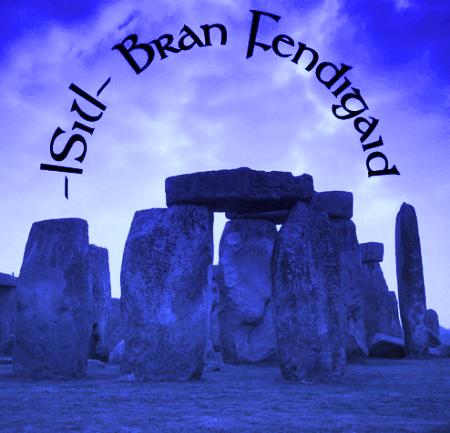
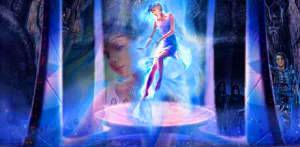
In the bloodiest of battles that ensued, the Irish were able to reincarnate their dead using the Magic Cauldron, so
the fighting was harder than had ever been seen before. Eventually the battle was ended, but neither side was triumphant.
Only seven Britons escaped alive. Bran was not amongst them. He had been mortally wounded in the foot by a poisoned dart,
only surviving long enough to request that his head be cut off and buried on Gwynfryn (the 'White Mount' where the Tower of
London now stands) in Caer-Lundein (London). Upon his death the harvests back in Britain failed and the land became barren
and unworkable.
The seven survivors did as they were bid and returned to Britain.
For seven years they stayed in Harlech, entertained by the head which continued to speak and knew nothing but joy and mirth.
They later moved on to Gwales (Grassholm Island
off Dyfed) where they lived for an incredible eighty years without perceiving the passing of time. Eventually, one of the
men opened the door of the hall which faced Cornwall which
everything was brought back to them. They felt they must continue on their journey to London
where they buried Bran's head, facing the Continent as a protective talisman against invasion.
Archaeological evidence has clearly shown that the cult of the head was a highly popular one amongst the Celts. Perhaps
there was a temple on Tower Hill. Stone-carved heads have been discovered from across the Celtic World and, in Provence on the Continent, a gruesome skull-covered altar has been
unearthed. Roman records occasionally refer to Celtic peoples as head-hunters who kept the severed heads of their enemies
as trophies. A connected story may hold a memory of how this pagan cult was swept away when Christianity arrived in Britain. King Arthur apparently declared that he needed no
talisman to protect his own country and dug up Bran's head as proof that he could perform the requirements himself.
Sadly, he did not succeed and internal political squabbles led to his death and the increase of Saxon settlement in
Britain. The tradition survives, however,
with the Ravens (Bran in Welsh) still kept at the Tower of London. It is said that if they were ever to leave, then Britain would fall to invaders from without. Their wings are wisely kept clipped.
Much of the information available about Bran the Blessed strongly suggests that at least part of his legend entered
into later Arthurian romance. His Magic Cauldron is probably that sought by King Arthur in the Welsh poem, the "Spoils of
the Annwfn". As in Bran's Irish tale, Arthur travels to the Celtic Otherworld and, like the Welsh tale, only seven men survive.
The vessel was later reborn as the Holy Grail, the cup of plenty or cornucopia found in mythology from across the Globe. The
wound to Bran's foot, inflicted by a poisoned spear, which caused his lands to fail is echoed in that of the Arthurian Grail
guardian, known as the Grail or Fisher King. His latter title may be related to Bran's association with rivers and river-crossings
(such as those he encountered in Ireland).
His castle was Corbenic or Castell Dinas Bran, both names deriving from the word Raven or Crow.
The Fisher King, like Bran's head, could feast with his followers indefinitely and his forename was said to
be Bron (or Brons) in the so-called Didot Perceval: clearly a transformation of Bran. Here, he is given a wife, Anna, the
daughter of St. Joseph of Arimathea, probably through confusion with his grandmother, Beli Mawr's wife, Anu. Bran may
also be the original of other Arthurian characters like Brandegorre, Bran de Lis, Brandelidelin or Ban of Benoic.
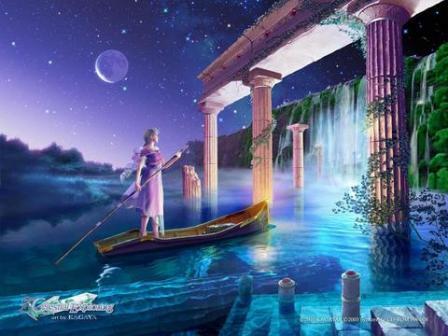
|
|
|
|
 |
 |
|
|
 |
 |
|
|
 |
 |
|
|
 |
 |
|
|
 |
 |
|
|
 |
 |
 |
 |
|
 |
 |
|
 |
 |
|
 |
 |
|
 |
 |
|
 |
 |
|
|
Bran’s Journey To The Isle Of Women
The tale is narrative of a journey made by Bran and his followers to the Isle of Women (known in Irish as "Emne" or "Emain Ablach"), and his attempt to return home.
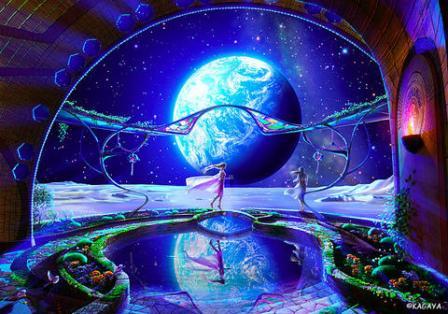
|
Invitation to
the Otherworld |
|
|
|
|
|
Bran, the son of Febal, was strolling outside of his stronghold or dun,
when he heard music behind him. No matter how he turned his head, the music was always behind his head. The music was so sweet
that it lulled him to a magic slumber.
When Bran woke from his strange sleep, he saw a silver branch with white
apple blossoms. Bran brought the branch with him to show to his family and friends, where he met a woman in a strange gown.
The woman sang of the Emain Ablach ( or "Isle of Women"), where the beautiful lived.
The seasons never changed, the weather was perfectly sunny, yet there
was always water. There was always an endless supply of food. The people never became sick or grow old. No one
ever died, nor did they know grief and sorrow. She was describing the Otherworld.
The woman ended her song with an invitation for Bran to seek out her
beautiful island, before she left, she took the silver branch and blossoms with her.
The next day, Bran organized three companies of 9 men in three
currach (plural for curragh or boats), which included his three foster-brothers, as they embarked on a voyage to visit the
Isle of Women.
They would sail on for two days before meeting a man standing in a chariot
drawn by a golden horse, as if he was driving in an open plain, instead of the sea.
The charioteer introduced himself as Manannán Mac Lir, the Irish god of the sea. Manannán told them that he would become the father of Mongan,
by sleeping with Caintigern, the wife of Fiachna.
Manannán also sang about Emain Ablach.
Manannán also encouraged Bran to seek out the island. Manannán told Bran
that he should reach it before sunset. |
|
|
Related
Information |
|
Name
|
|
Bran
– "Raven". |
|
Sources
|
|
Imram Brain (The
Voyage of Bran) from the Book of the Dun Cow and the Book of Leinster. |
|
|
|
|
|
|
|
|
|
|
|
|
|
|
|
|
 |
 |
|
|
 |
 |
|
|
 |
 |
|
|
 |
 |
|
|
 |
 |
|
|
 |
 |
 |
 |
|
 |
 |
|
 |
 |
|
 |
 |
|
 |
 |
|
 |
 |
|
|
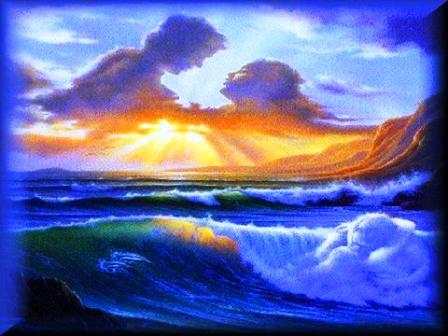
|
|
|
|
|
Before he reached the Emain Ablach (the Isle of Women), the voyagers
reached an island, where they found a crowd of people laughing in delight. Bran sent one of his followers to explore the island.
As Bran's companion came upon the people, he began to laugh like the islanders.
When Bran saw that his missing companion would not return, he didn't send anyone to fetch him. So they left their companion
behind in the Isle of Joy or Isle of Merriment, and sailed away.
Not long after leaving the Isle of Joy, they arrived at their destination.
They found a woman waiting for them on the shore.
Apparently, Bran has some misgivings about landing in the port of the
Emain Ablach. The leader of the women produced a magic ball of thread in her hand. Holding
to to one end of the thread, the queen threw the ball to Bran's curragh. When
Bran caught the ball, he could not let go of the ball. The queen easily pulled
the curragh to her island. The queen easily pulled the curragh to her island.
(This magic ball of thread was a property of the queen in tale called
the Voyage of Mael Duin. It is quite possible that this was the same island that Mael Duin had visited (including the Isle of Joy), as well
as the same queen.)
The queen and the other women welcomed the visitors quite warmly. Each
man was paired off with a woman of the island.
Bran shared his bed with the queen.
|
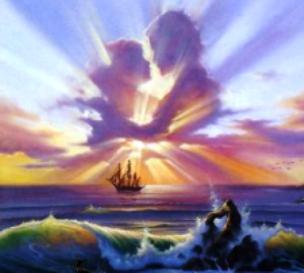
|
|
|
As they had been told, they lived on the island, where there were no changes
to the sunny weather. The food and wine were never in short supply. All of their desires were sated.
It seemed that they had only stayed on the beautiful island for a few
years. Bran and his companions didn't realize how much of real time had passed in the outside world.
One day, Nechtan, the son of Collbran, felt homesick, and informed Bran
he wished to return home to Erin (Ireland). Bran told the queen that they would now return home.
The Queen warned them that they would regret it if they left the island.
However, Bran insisted on leaving the Isle of Women. So the Queen warned
them that they should not set foot on dry land, if they returned to Ireland.
(This is so unlike the tale of Mael Duin, where the queen kept them on the island against their will. See the Queen and her Magic Clew, in the Voyage of Mael Duin, for comparison.)
Bran and his companions departed from the isle, and picked up their missing
companion on the Isle of Joy. They arrived at Srub Brain (somewhere in Ireland),
while staying on their currach. One of the men on the shore, who saw the arrival of the currach, asked them who they were.
Bran replied that he was Bran, the son of Febal. The man on the shore that they know of no one named Bran, except what was
told in their ancient legend.
Nechtan ignoring the queen's warning to not set foot on dry land, he leaped out
of the curragh. The moment he touched dry land, Nechtan was reduced to ashes, as if he had been part of the earth for hundreds
of years.
Bran told the people on the shore of his adventure to the Isle of Women,
where their story was recorded. |
|
|
|
|
 |
 |
|
|
 |
 |
 |
 |
|
|
AAA
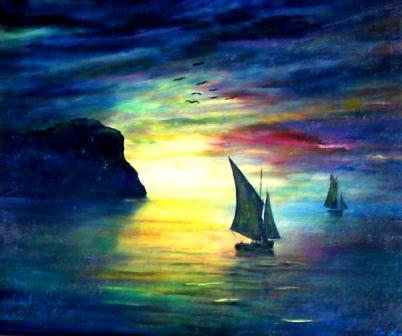
Then Bran and his companions sailed away in their currach, and were never heard of again.
|
|
|
 |
 |
|
|
 |
 |
|
|
 |
 |
|
|
 |
 |
|
|
 |
 |
 |
 |
|
 |
 |
|
 |
 |
|
 |
 |
|
Story of the Tuatha De Danaan and of the Fianna of Ireland
 |
 |
|
|
gjdkjf
It is not known
for what length of time the Tuatha de Danaan had the sway over Ireland, and it is likely it was a long
time they had it, but they were put from it at last.
It was at Inver
Slane, to the north of Leinster, the sons of Gaedhal of the Shining Armour, the Very Gentle, that were called afterwards the
Sons of the Gael, made their first attempt to land in Ireland to avenge Ith, one of their race that had come there one time
and had met with his death.
It is under the
leadership of the sons of Miled , and it was from the south they came, and their Druids had told them there was no country
for them to settle in till they would come to that island in the west. "And if you do not get possession of it yourselves,"
they said, "your children will get possession of it."
|
|
|
 |
 |
But when the
Tuatha de Danaan saw the ships coming, they flocked to the shore, and by their enchantments they cast a cloud over the whole
island. And when the sons of Miled were hindered from landing there by enchantments, they went sailing along the coast till
at last they were able to make a landing at Inver Sceine in the west of Munster.
From that they
marched in good order as far as Slieve Mis. And there they were met by a queen of the Tuatha de Danaan and a train of beautiful
women attending on her, and her Druids and wise men following her. Amergin, one of the sons of Miled, spoke to her then, and
asked her name, and she said it was Banba, wife of Mac Cuill, Son of the Hazel.
They went on
then till they came to Slieve Eibhline, and there another queen of the Tuatha de Danaan met them, and her women and her Druids
after her, and they asked her name, and she said it was Fodhla, wife of Mac Cecht, Son of the Plough.
They went on
then till they came to the hill of Uisnech, and there they saw another woman coming towards them. And there was wonder on
them while they were looking at her, for in the one moment she would be a wide-eyed most beautiful queen, and in another she
would be a sharp-beaked, grey-white crow. She came on to where Eremon, one of the sons of Miled, was, and sat down before
him, and he asked her who was she, and she said: "I am Eriu, wife of Mac Greine, Son of the Sun."
And the names
of those three queens were often given to Ireland
in the after time.
 |
 |
|
|
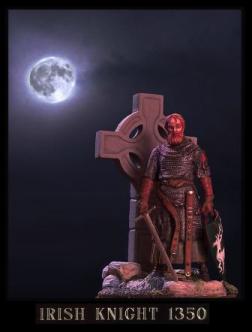
The Sons of the
Gael went on to Teamhair, where the three sons of Cermait Honey-Mouth, son of the Dagda, that had the kingship between them
at that time held their court. And these three were quarrelling with one another about the division of the treasures their
father had left, and the quarrel was so hot it seemed likely it would come to a battle in the end.
And the Sons
of the Gael wondered to see them quarrelling about such things, and they having so fruitful an island, where the air was so
wholesome, and the sun not too strong, or the cold too bitter, and where there was such a plenty of honey and acorns, and
of fish, and room enough for them all.
|
|
|
 |
 |
Great grandeur
they were living in, and their Druids about them, at the palace of Teamhair.
And Amergin went to them, and it is what he said, that they must give up the kingship there and then, or they must leave it
to the chance of a battle. And he said he asked this in revenge for the death of Ith, of the race of the Gael, that had come
to their court before that time, and had been killed by treachery.
 |
 |
|
|
When the sons
of Cermait Honey-Mouth heard Amergin saying such fierce words, there was wonder on them, and it is what they said, that they
were not willing to fight at that time, for their army was not ready. "But let you make an offer to us," they said, "for we
see well you have good judgment and knowledge. But if you make an offer that is not fair," they said, "we will destroy you
with our enchantments."
|
|
|
 |
 |
At that Amergin
bade the men that were with him to go back to Inver Sceine, and to hurry again into their ships with the rest of the Sons
of the Gael, and to go out the length of nine waves from the shore. And then he made his offer to the Tuatha de Danaan, that
if they could hinder his men from landing on their island, he and all his ships would go back again to their own country,
and would never make any attempt to come again; but that if the Sons of the Gael could land on the coast in spite of them,
then the Tuatha de Danaan should give up the kingship and be under their sway.
The Tuatha de
Danaan were well pleased with that offer, for they thought that by the powers of their enchantments over the winds and the
sea, and by their arts, they would be well able to keep them from ever setting foot in the country again.
 |
 |
|
|
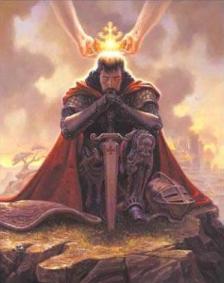
So the Sons of
the Gael did as Amergin bade them and they went back into their ship and drew up their anchors and moved out to the length
of nine waves from the shore. And as soon as the Men of Dea saw they had left the land, they took to their enchantments and
spells, and they raised a great wind that scattered the ships of the Gael, and drove them from one another. But Amergin knew
it was not a natural storm, and Arranan, son of Miled, knew that as well, and he went up in the mast of his ship to look about
him. But a great blast of wind came against him, and he fell back into the ship and died on the moment.
|
|
|
 |
 |
And there was
great confusion on the Gael, for the ships were tossed to and fro, and had like to be lost. And the ship that Donn, son of
Miled, was in command of was parted from the others by the dint of the storm, and was broken in pieces, and he himself and
all with him were drowned, four-and-twenty men and women in all. And Ir, son of Miled, came to his death in the same way,
and his body was cast on the shore, and it was buried in a small island that is now called Sceilg Michill. A brave man Ir
was, leading the Sons of the Gael to the front of every battle, and their help and their shelter in battle, and his enemies
were in dread of his name.
And Heremon,
another of the sons of Miled, with his share of the ships, was driven to the left of the island, and it is hardly he got safe
to land. And the place where he landed was called Inver Colpa, because Colpa of the Sword, another of the sons of Miled, was
drowned there, and he trying to get to land. Five of the sons of Miled in all were destroyed by the storm and the winds the
Men of Dea had raised by their enchantments, and there were but three of them left, Heber, and Heremon, and Amergin.
And one of them,
Donn, before he was swept into the sea, called out: "It is treachery our knowledgeable men are doing on us, not to put down
this wind." "There is no treachery," said Amergin, his brother. And he rose up then before them, and whatever enchantment
he did on the winds and the sea, he said these words along with it:
 |
 |
|
|
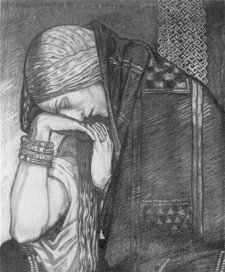
"That they that
are tossing in the great wide sea may reach now to the land.
That they may
find a place upon its plains, its mountains, and its valleys; in its forests that are full of nuts and of all fruits; on its
rivers and its streams, on its lakes and its great waters.
That we may have
our gatherings and our races in this land; that there may be a king of our own in Teamhair; that it may be the possession
of our many kings."
|
|
|
 |
 |
"That the sons
of Miled may be seen in this land, that their ships and their boats may find a place there.
"This land that
is now under darkness, it is for it we are asking; let our chief men, let their learned wives, ask that we may come to the
noble woman, great Eriu."
After he had
said this, the wind went down and the sea was quiet again on the moment.
And those that
were left of the sons of Miled and of the Sons of the Gael landed then at Inver Sceine.
And Amergin was
the first to put his foot on land, and when he stood on the shore of Ireland,
it is what he said:
|
|
 |
 |
|
|
 |
 |
|
|
 |
 |
|
|
 |
 |
 |
 |
It is a marvelous,
wonderful
plain to Bran,
In his coracle
crossing
the clear
sea.
I myself
in my chariot
of distance
see
A plain
of flowers
of easy
passage.
Immram
Brain
|
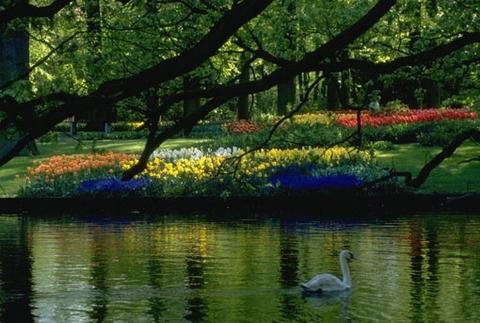
|
|
 |
 |
 |
 |
|
|
We are here for the sake
of each other.
Above all, for those upon whose
smile & well-being
our own happiness depends.
ALBERT EINSTEIN
|
|
 |
 |
 |
 |
|
 |
 |
|
 |
 |
|
 |
 |
|
The power of seeing things invisible
to others;
the power of foreseeing future events
by means
of shadows thrown before them.
Many Highlanders claim this power,
which ancient Gaels called Shadow-Sight
(Taischitaraugh).
“Nor less availed his optic sleight,
And Scottish Gift of Second Sight.”
Second Sight, a term denoting the opposite of its apparent significance, meaning in reality
the seeing, in vision, of events before they occur.
Foresight expresses the meaning of
Second Sight, which perhaps was originally so called because normal vision was regarded as coming first, while super normal
vision is a secondary thing,
confined to certain individuals.
 |
 |
|
| SCOTTISH GIFT OF SECOND SIGHT |
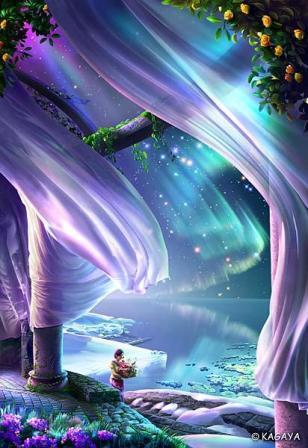
|
| AWAKE VISIONS |
Though we hear most of the Second Sight
among the Celts of the Scottish Highlands (it is much less familiar to the Celts of
Ireland), this species of involuntary prophetic vision,
whether direct or symbolical
is peculiar to no people.
Second Sight is traditionally
believed to be a “psychic”
ability, that of having spontaneous Awake Visions, which apparently gives information about a spatially or temporarily distant event.
It is usually associated with people living in Scotland,
especially in the
Western Isles and Highlands.
|
|
 |
 |
|
|
 |
 |
|
|
 |
 |
|
|
 |
 |
|
|
 |
 |
 |
 |
|
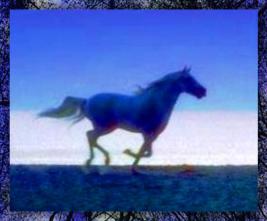
|
“It takes all the running you can do to stay in
the same place.
In order to get anywhere you have to run at least
twice as fast.”
Alice in Wonderland
~ Lewis Carroll
|
|
 |
 |
 |
 |
”The interpretation of Dreams
is the road to a knowledge
Of the unconscious activities of
the Mind.”
Simone Weil, French Philosopher
and Activist
in the French Resistance during
World War II
(1909-1943)
|
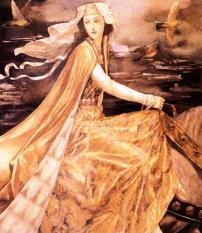
|
|
 |
 |
|
 |
 |
|
 |
 |
|
 |
 |
|
|
Dream - Originates from Middle English.
| DREAM-Originates from Middle English |

|
| word DREME which means "JOY" and "MUSIC". |
The word "Dreme" which means Joy and Music.
|
|
|
 |
 |
 |
 |
|
 |
 |
Intuition
1- Immediate apprehension by the mind without reasoning.
2- Immediate apprehension by a sense. 3- Immediate insight. (Intuitionalism. Philos. The belief that primary truths and principles
esp. of ethics and metaphysics are known directly by intuition.
Intuition. The ability to see any event, any object
from a viewpoint of the cosmic whole, from it's culmination - the seed, the flower, the fruit in relation to the
whole. The knowing of something without prior knowledge or the use of reason. All stands revealed the hearts, the motives,
the causes of all events. Intuition can be said to be a comprehensive grip of the principles of universality.
The intuitive type: Creative people, people with
hunches whose chief concern is with future possibilities. They are able to sense the invisible and the impalatable. They perceive
wholes and compress much in a flash. Poets and prophets are often intuitive.
Be willing to let your intuition
guide you.
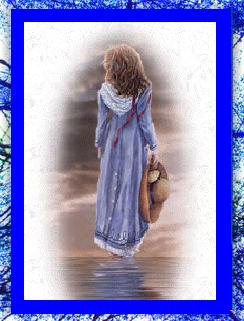
Be
willing to follow that guidance
Be willing to follow that guidance
|
|
 |
 |
|
|
 |
 |
|
|
 |
 |
|
|
 |
 |
|
|
|
 |
 |
|

